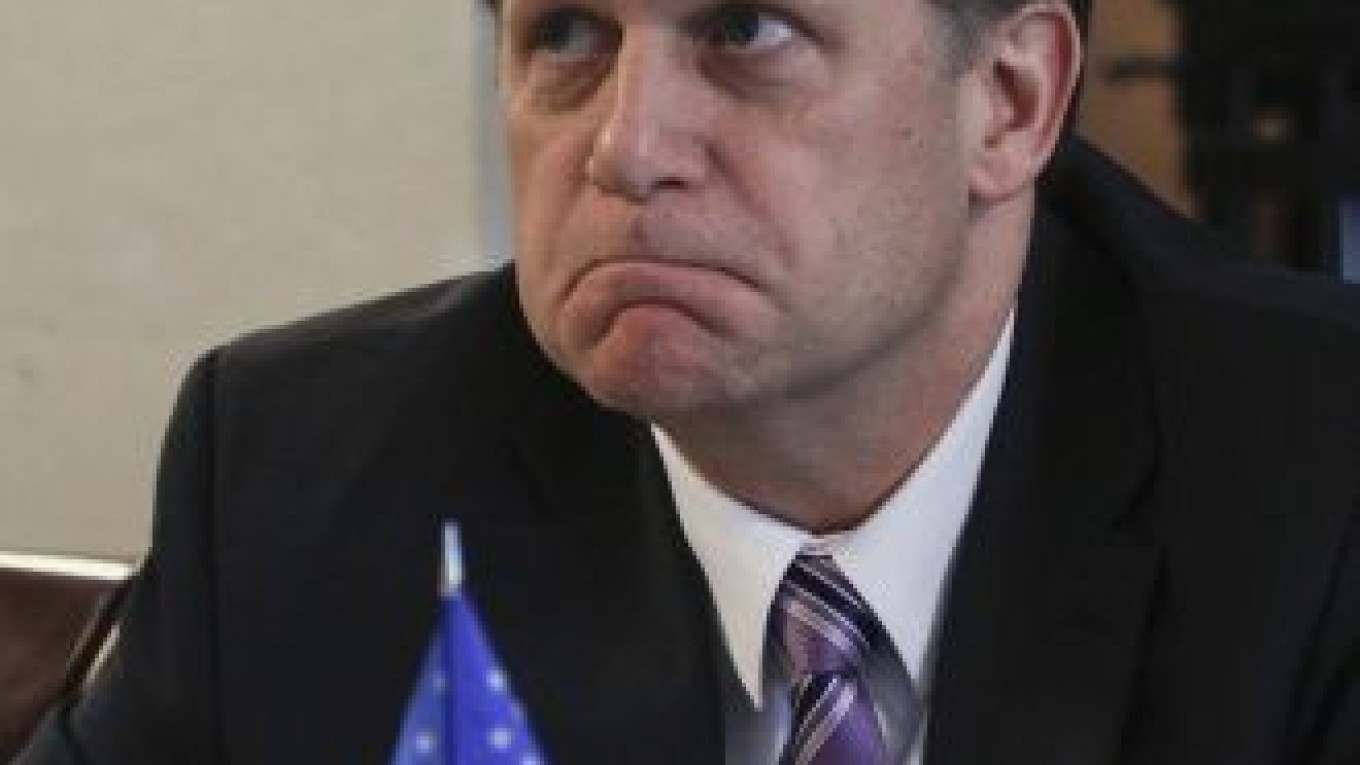Nongovernmental organizations across the country are being threatened with fines stretching to $20,000 or more, as authorities press on with sweeping checks that activists are calling a government-orchestrated crackdown on civil society.
Prosecutors have said the checks are aimed at uncovering extremist activity and are routine, but NGOs fear they are part of a wider campaign to bring the nongovernmental sector to heel. Many independent organizations say they would be forced to close if prosecutors follow through on threats of hefty fines.
"Several NGOs are being raided by prosecutors as we speak, and about a dozen have been sanctioned. But this is only the start. Eventually, I estimate that hundreds will be fined or sanctioned in other ways," said Pavel Chikov, a member of President Vladimir Putin's human rights council.
Since the checks began in late February, officials from agencies including the Prosecutor General's Office, the Justice Ministry and the Emergency Situations Ministry have raided hundreds of NGOs active in fields from ecology to human rights.
Prosecutors have also questioned the heads of several prominent NGOs, demanded accounting documents and conducted a range of impromptu tests. Fines have been issued for offenses including safety violations and misdemeanor charges filed against activists accused of obstructing the checks.
The inspections follow legislation that came into force in November obliging foreign-funded NGOs engaging in "political activities" to register as "foreign agents." The law provoked a storm of criticism among activists and confusion at the Justice Ministry, which initially described it as unenforceable.
As yet, only one NGO has registered as a foreign agent under the law.
Chikov, who heads the Agora rights group, said that his organization had refused to give prosecutors the documents they demanded during their check, but that Agora had not been punished for doing so.
"They can find all the documents they're looking for at the Federal Tax Service, and, in any case, we view the checks as illegal," he said, adding that his group had no intention of registering as a foreign agent.
Prosecutors have strongly refuted claims that the NGO inspections are biased, and Foreign Ministry spokesman Alexander Lukashevich said during his weekly press briefing Thursday that authorities were "simply trying to bring discipline to the activities of foreign NGOs" and acting within the realms of Russian law.
U.S. Ambassador Michael McFaul told the Russian Public Chamber on Thursday that, although he hoped the NGO checks would not strain U.S.-Russian relations, Washington was concerned about the "new challenges to contacts between our societies," Interfax reported.
Among the NGOs facing the steepest sanctions, the St. Petersburg-based Bellona environmental group has been told to pay 640,000 rubles ($20,000) for violations including failing to conduct fire drills and measure the level of ions in its offices.
Contacted by phone on Thursday, Nikolai Rybakov, Bellona's executive director, said that his organization's future would be placed in real jeopardy should prosecutors insist on his group paying the full $20,000.
"Such a fine would close practically any NGO in Russia," Rybakov said, adding that Bellona couldn't be obliged to register as a foreign agent because it solely promotes environmental preservation.
Other sanctioned groups include two Catholic parishes in the Rostov region that have each been issued with 450,000 ruble fines for fire-safety violations, Kommersant reported.
Two activists described the foreign agent law, on which the checks appear to be based, as fundamentally flawed and said authorities were sniffing out weak spots that could be used to pressure them in the future.
"It's people's duty to try to influence government legislation, and activists should not be considered foreign agents for doing so," said Valery Borshchyov, a veteran rights defender with the Moscow Helsinki Group.
Borshchyov drew attention to the fact that prosecutors launched the first checks days after Putin reminded senior Federal Security Service officers to enforce the new NGO rules. "It was a simple order," he said.
Echoing Chikov, Borshchyov said it would be "senseless" for the Moscow Helsinki Group to register as a foreign agent, but he cautioned that many other NGOs would be scared into applying for the new legal status.
"We are witnessing an unprecedented effort to pressure civil society," he said.
Contact the author at a.winning@imedia.ru
Related articles:
A Message from The Moscow Times:
Dear readers,
We are facing unprecedented challenges. Russia's Prosecutor General's Office has designated The Moscow Times as an "undesirable" organization, criminalizing our work and putting our staff at risk of prosecution. This follows our earlier unjust labeling as a "foreign agent."
These actions are direct attempts to silence independent journalism in Russia. The authorities claim our work "discredits the decisions of the Russian leadership." We see things differently: we strive to provide accurate, unbiased reporting on Russia.
We, the journalists of The Moscow Times, refuse to be silenced. But to continue our work, we need your help.
Your support, no matter how small, makes a world of difference. If you can, please support us monthly starting from just $2. It's quick to set up, and every contribution makes a significant impact.
By supporting The Moscow Times, you're defending open, independent journalism in the face of repression. Thank you for standing with us.
Remind me later.






